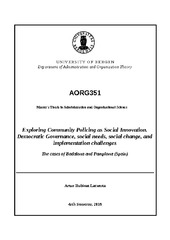| dc.description.abstract | This thesis reads Community Policing as Social Innovation. Social Innovation is defined as new solutions to cover or meet social needs with the perspective of social change and well being improvement. Applied to the public sector and specifically to police reform, this means to link democratic governance mechanisms (citizen and community participation), with meeting security needs and social change. We study the Local Police reforms in the middle cities of Badalona and Pamplona (Spain) for the period 2015 – 2018. The cities share a recent past of corruption in the police, excessive use of force and lack of citizen participation, and now, a new police model based on a similar philosophy. We carry out an explorative multiple case study where the unit of analysis is the police reform, and the data used news, administrative documents and interviews. This thesis has four main justifications. First, the two reforms shows that a new direction on police and policing is possible in Spain. Second, it is needed to read Community Policing as Social Innovation to have new analytical dimensions in relation to police reform. Third, that means that there is the need to better connect democratic governance, social needs and social change. And four, there is always the question of implementation challenges. This makes us propose four Research Questions that ask if the two reforms are designed under the ideas of Social Innovation, the practical consequences of this ideas, the implementation factors and scenarios, and finally, the theoretical and practical consequences of this two reforms in relation other police models. We give a tentative answer to this questions in the theoretical framework. All in all, the results in relation to our Research Questions are as follows. First, the police reforms are defined clearly under the principles of Social Innovation. There are some differences between cities but many commonalities, for example, a strong emphasis on democratic governance as mechanisms to define the security needs of vulnerable social groups. May be, the question of social change even if present, is less seen. As for the practical consequences of this philosophical principles, we have detected many new different mechanisms and measures. Last but not least, we have also seen important commonalities in relation to implementation. In this line, we confirm the four implementation factors proposed with some differences between cities. We have also detected similar scenarios of implementation that we define as contradictory. That means a situation of counterbalancing effects between factors of implementation, and internal tensions inside each of the factors. | en_US |
